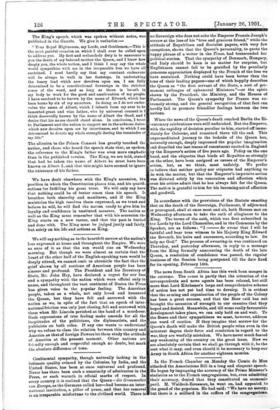Continental sympathy, though naturally lacking in the intimate quality evinced
by the Colonies, by India, and the United States, has been at once universal and profound. Never has there been such a unanimity of admiration in the Press, or such warmth in official marks of respect. In every country it is realised that the Queen—die Grossmutter von, Europa, as the Germans called her—had become an inter- national institution, a pillar of peace, and that her removal is an irreparable misfortune to the civilised world. There is no Sovereign who does not echo the Emperor Francis Joseph's sorrow at the loss of his "true and gracious friend," while the attitude of Republican and Socialist papers, with very few exceptions, shows that the Queen's personality, to quote the happy phrase of a writer in the Times, had transcended her political station. That the sympathy of Denmark, Hungary, and Italy should be keen is no matter for surprise, but Englishmen cannot fail to be gratified by the peculiarly generous appreciation displayed by the French of the lose we have sustained. Nothing could have been better than the tone of their leading papers—one of which happily describes the Queen as "the first servant of the State, a sort of per- manent colleague of ephemeral Ministers "—or the spirit shown by the President, the Ministry, and the Houses of Parliament. The Queen's sympathy for France was ex- tremely strong, and the general recognition of that fact can hardly fail to promote friendlier feelings between the two nations.


















































 Previous page
Previous page